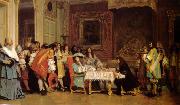Wholesale Oil Painting No Minimum |
|||||||||||
|
|
|||||||||||

|
|||||||||||
|
|
|
||||||||
Jean Honore Fragonard1732-1806 French Jean Honore Fragonard Locations French painter. He studied with François Boucher in Paris c. 1749. He subsequently won a Prix de Rome, and while in Italy (1756 ?C 61) he traveled extensively and executed many sketches of the countryside, especially the gardens at the Villa d Este at Tivoli, and developed a great admiration for the work of Giovanni Battista Tiepolo. In 1765 his large historical painting Coresus Sacrifices Himself to Save Callirhoë was purchased for Louis XV and won Fragonard election to the French Royal Academy. He soon abandoned this style to concentrate on landscapes in the manner of Jacob van Ruisdael, portraits, and the decorative, erotic outdoor party scenes for which he became famous (e.g., The Swing, c. 1766). The gentle hedonism of such party scenes epitomized the Rococo style. Although the greater part of his active life was passed during the Neoclassical period, he continued to paint in a Rococo idiom until shortly before the French Revolution, when he lost his patrons and livelihood. |
||||||||
|
|
||||||||
Louis XIV and Moliere
Louis XIV and Moliere Painting ID:: 1443 |
1863
Catalogue #138
42 x 75 cm (16.5 x 29.5 inches) 1863 Catalogue #138 42 x 75 cm (16.5 x 29.5 inches) |
|||||||
|
|
||||||||
|
Jean Leon Gerome French 1824-1904 Jean Leon Gerome Galleries French painter, sculptor, and teacher. Son of a goldsmith, he studied in Paris and painted melodramatic and often erotic historical and mythological compositions, excelling as a draftsman in the linear style of Jean-Auguste-Dominique Ingres. His best-known works are scenes inspired by several visits to Egypt. In his later years he produced mostly sculpture. He exerted much influence as a teacher at the Ecole des Beaux-Arts; his pupils included Odilon Redon and Thomas Eakins. A staunch defender of the academic tradition, he tried in 1893 to block the government acceptance of the Impressionist works bequeathed by Gustave Caillebotte. Louis XIV and Moliere 1862(1862) Medium Oil on panel Dimensions 42 x 75 cm cyf |
||||||||
|
|
||||||||
|
Prev Next
|
||||||||
|
|
||||||||
|
Related Paintings to Jean Leon Gerome :. |
||||||||
|
|
||||||||
|
CONTACT US |

